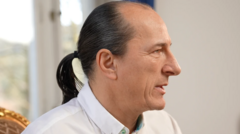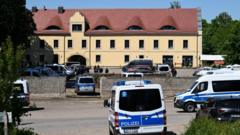The German government has executed a nationwide crackdown on a far-right group known as the Kingdom of Germany, arresting leaders and dismantling their operations, as it intensifies efforts against extremist movements.
Germany Bans Far-Right Group, Arresting Leaders in Major Raids

Germany Bans Far-Right Group, Arresting Leaders in Major Raids
Authorities act against the "Kingdom of Germany," a group undermining the German state, amid growing far-right extremism.
In a significant development, German authorities announced on Tuesday the banning of a far-right organization that has sought to undermine the legitimacy of the German state by proposing a parallel government. The group, self-identified as the Kingdom of Germany, has attracted attention for its refusal to recognize the constitutional order of Germany and aims to create its own operational structures, including currency, identity cards, and even its own bank.
This crackdown was enforced through coordinated nationwide raids involving 800 police officers across seven federal states. Notably, four of the group’s leaders were taken into custody, including Peter Fitzek, who calls himself the “king” of this supposed kingdom. Fitzek faces serious allegations, including the leadership of a criminal organization and illegal financial activities such as selling unregulated insurance and investments.
The German authorities estimate that the Kingdom of Germany comprises around 1,000 active participants. This organization is the largest faction within the broader Reichsbürger movement, which is characterized by its extremist views, including the belief that the current German government is illegitimate and operated by unseen “deep-state” forces. Such ideologies are often intertwined with antisemitic and anti-democratic conspiracy theories.
Following the raids, Alexander Dobrindt, Germany's newly appointed interior minister, emphasized the government's commitment to dismantling groups that threaten constitutional integrity. "The aim of this association is to establish a so-called parallel state and to secede from the Federal Republic of Germany," he remarked, underscoring the administration's resolve to counter the rise of far-right extremism.
As the global landscape grapples with various extremist movements, Germany's actions may serve as a critical case study on the responses of democratic societies to groups that challenge state legitimacy and promote conspiratorial thinking.
This crackdown was enforced through coordinated nationwide raids involving 800 police officers across seven federal states. Notably, four of the group’s leaders were taken into custody, including Peter Fitzek, who calls himself the “king” of this supposed kingdom. Fitzek faces serious allegations, including the leadership of a criminal organization and illegal financial activities such as selling unregulated insurance and investments.
The German authorities estimate that the Kingdom of Germany comprises around 1,000 active participants. This organization is the largest faction within the broader Reichsbürger movement, which is characterized by its extremist views, including the belief that the current German government is illegitimate and operated by unseen “deep-state” forces. Such ideologies are often intertwined with antisemitic and anti-democratic conspiracy theories.
Following the raids, Alexander Dobrindt, Germany's newly appointed interior minister, emphasized the government's commitment to dismantling groups that threaten constitutional integrity. "The aim of this association is to establish a so-called parallel state and to secede from the Federal Republic of Germany," he remarked, underscoring the administration's resolve to counter the rise of far-right extremism.
As the global landscape grapples with various extremist movements, Germany's actions may serve as a critical case study on the responses of democratic societies to groups that challenge state legitimacy and promote conspiratorial thinking.



















